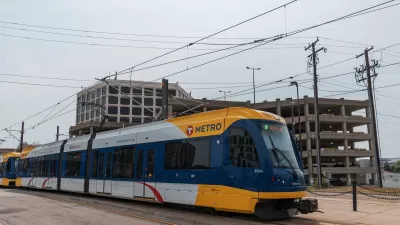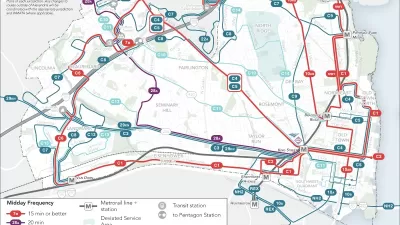A few weeks ago, I was reading yet another think-tank paper arguing against new rail projects. Amidst the sea of technical detail, one assertion bothered me: the common claim that bus service is more “flexible” than rail.
A few weeks ago, I was reading yet another think-tank paper
arguing against new rail projects.
Amidst the sea of technical detail, one assertion bothered me: the
common claim that bus service is more "flexible" than rail.
Indeed it is- and that's precisely what's wrong with
it. Flexibility means unreliability. In particular, flexibility means that politicians can eliminate your bus service whenever
recession or overspending in other areas leads to a fiscal crisis. Bus service is an easy target: it often
serves people too poor to give campaign contributions or become politically
organized, and its environmentalist supporters have dozens of other issues to
worry about. For example, in Denver bus ridership is
rising- yet due to increased fuel costs, service may actually be reduced. (See http://www.9news.com/news/article.aspx?storyid=91837
)
Politicians tend to justify bus cutbacks by stating that
they are merely reducing low-performing service. But as long as there is more than one bus
route in a city, some routes will always have fewer riders than others. So this theory, if consistently applied,
would ultimately lead to the elimination of every route but the most popular
one- hardly a desirable result.
By contrast, recessions and other economic problems tend to
have a relatively modest impact on rail and highway service- perhaps because
the larger up-front costs of rail and highway expansion cannot be recovered by
cutbacks in service, perhaps because affluent, politically influential people
are more willing to drive or ride trains.
Does the reliability of rail service mean transit supporters
and users should support new rail service in every city? Not necessarily; obviously, intracity rail
service is not practical everywhere.
But certainly, this factor is one of many relevant considerations – a
thumb on the scale favoring construction of new subways and light rail systems.
Of course, it is certainly possible to make bus service less
vulnerable to the political winds. For
example, imagine an America in which state or federal civil rights law protected bus
service from cutbacks, on the grounds that cutting bus service without blowing
up the occasional highway or two had a disproportionate impact on racial minorities or adversely affected air quality. In such an America, bus service would be as politically impregnable
as highways or even rail service- and I would certainly be less willing to support
rail service in my city.
But of course, that's not the America I live in.

Planetizen Federal Action Tracker
A weekly monitor of how Trump’s orders and actions are impacting planners and planning in America.

Chicago’s Ghost Rails
Just beneath the surface of the modern city lie the remnants of its expansive early 20th-century streetcar system.

San Antonio and Austin are Fusing Into one Massive Megaregion
The region spanning the two central Texas cities is growing fast, posing challenges for local infrastructure and water supplies.

Since Zion's Shuttles Went Electric “The Smog is Gone”
Visitors to Zion National Park can enjoy the canyon via the nation’s first fully electric park shuttle system.

Trump Distributing DOT Safety Funds at 1/10 Rate of Biden
Funds for Safe Streets and other transportation safety and equity programs are being held up by administrative reviews and conflicts with the Trump administration’s priorities.

German Cities Subsidize Taxis for Women Amid Wave of Violence
Free or low-cost taxi rides can help women navigate cities more safely, but critics say the programs don't address the root causes of violence against women.
Urban Design for Planners 1: Software Tools
This six-course series explores essential urban design concepts using open source software and equips planners with the tools they need to participate fully in the urban design process.
Planning for Universal Design
Learn the tools for implementing Universal Design in planning regulations.
planning NEXT
Appalachian Highlands Housing Partners
Mpact (founded as Rail~Volution)
City of Camden Redevelopment Agency
City of Astoria
City of Portland
City of Laramie





























